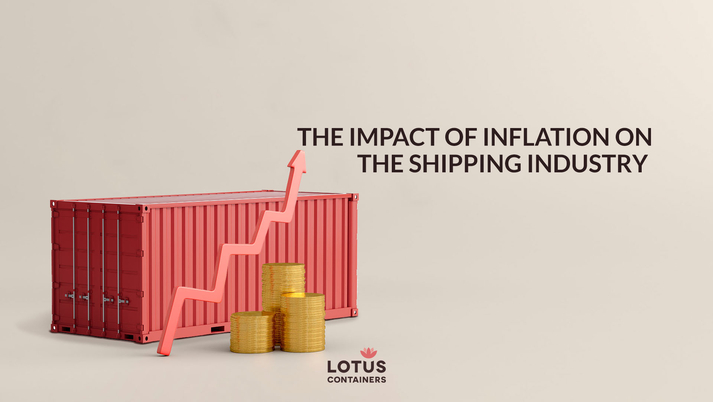The impact of inflation on the shipping industry has changed businesses in the logistics industry. One significant disruption and the transaction would go down dramatically. Do you know how and why the shipping industry plays a vital role for businesses worldwide?
The shipping industry, as we all know, started back in the 3rd century, when one could deliver goods via sea routes at lower prices than the roadways. It opened options for travelling around the globe, from one country to another.
People discovered various species, ornaments, and other goods that were not indigenously available in one country.
Slowly cargo containers came into existence, and the enterprise started manufacturing goods in bulk amounts. It accelerated sales in the mid-90s impacting medium to high-scale businesses. Down the lane, we realized that the shipping industry had been a crucial part of our journey. No matter which sector we work for, the shipping industry fulfils our day-to-day needs. Therefore, the tiniest disruptions can become a huge turning point for the marine industry.
Let us now explore the impact of Inflation on the shipping industry.
With time, inflation has always been up. We might have never come across the situation, which is the opposition to inflation. So, with inflation, prices of ordinary goods, cost of labour, manufacturing, processing, and delivery, altogether rise.
What is the impact of inflation on the shipping industry?
The relationship between a consumer and the shipping industry is direct. If the rate of shipping goods is high, consumers must pay a higher price to afford it. Surprisingly, it became impossible for a few months to deliver goods and materials across the ocean due to the significant crisis of COVID-19. This interrupted the smooth flow of goods and impacted trade worldwide. Due to the pandemic and complex financial crisis, various businesses were forced to shut down. Here is the list of factors that lead to inflation:
Fuel rates
Fuel prices have never gone down in the history of the world. It keeps increasing every year. Additionally, Ukraine and Russian war was a major contributor to fuel prices. As we all know, Russia is a significant fuel supplier. The global market is dependent on their supplies. Due to the war between Ukraine and Russia, the export of oils and fertilizers completely stopped leading to shortages in other areas. Additionally, the strong oil demand is the cause of rising prices. As a result, some maritime industries sustained significant losses and are today in economic ruin.
Higher manufacturing costs
One significant impact of inflation is supply chain disruption. We use the term like bingo but don’t know why. The answer is inflation. Inflation significantly affects the manufacturing units making goods expensive and unaffordable for manufacturers. This shortage can raise demand in the marketplace, leading to higher prices. One can reckon the pandemic as the reason which forced manufacturing units to stop and disrupted the supply chain. To accomplish or survive the post-pandemic era and manage the supply chain after the worst periods, businesses were compelled to sell their positions at a fixed price.
Shortage of labour
There is a worse-than-ever labour shortage because of the pandemic outbreak. As COVID-19 spread worldwide, many workers had to remain home and take measures. Instead of receiving monthly compensation, most workers got daily income. The widespread infection stopped them from approaching the workstations, but it allowed them to have a good night’s sleep throughout the day. Few also had a rotating schedule, which got rid of their daily income. After realizing their dependency on the shipping industry, many labours left work and started new roles. This causes labour scarcity, which raises demand and unemployment rates. The increased unemployment lowered their wages due to excessive competition, making the labour’s life miserable. Therefore, inflation and workers are indirectly related to each other.
Pandemic and Inflation
Industrialists and people in business believe that the pandemic has disrupted the world’s functioning, administration, and financial stability. While we encountered increased prices for many commodities, there was a sharp decline in others, like hotel booking tariffs, flight tickets and more. The significant impact of the pandemic was inflation which is still prevalent. Many companies fired their employees due to low budgets or bankruptcy, forcing humans to stay indoors.
Due to the pandemic, many countries could not receive the necessary commodities which otherwise could be delivered through shipping containers.
Shipping costs and Inflation
Unlike other industries, the container transport industry never stopped transporting goods worldwide. They might have slowed down due to the pandemic crisis, but they managed to deliver goods.
When the situation was critical, manufacturers, producers and executers raised the prices of goods and showcased increased materials prices. It takes a lot of gasoline to deliver any kind of goods, and we all know how expensive fuel is. After calculating the total cost to have a good at customers‘ doorstep, we can see a significantly dramatic peak. Meaning – a biscuit, if earlier was $0.37, would cost almost twice today.
So, if shipping costs increase, we encounter inflation and vice versa.
No doubt we are living in 2023, where we can expect more challenges than inflation, like unemployment, mass firing, low wages labour, and polluted cities due to back-to-office programmes. Still, the impact of inflation on the shipping industry is prevalent.
LOTUS Containers is generating awareness among the shipping industry to minimize fuel wastage and adopt greener ways to ship products across the nation. Join us and help us establish a better future with more sustainable practices. We are experts in buying and selling shipping containers and would like you to explore your possibilities today. Follow LOTUS Containers for more information.




